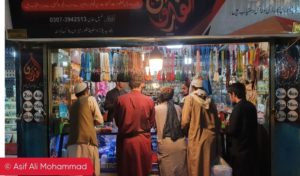Mohsin Ilyas

The global pandemic slashed income from small businesses for a massive majority of the Christian population in the slums of Islamabad.
The year 2020 turned out to be different due to the unique challenges it presented. A decline in income was observed worldwide as per the reports.
Christians living in 66 quarters and other slums of Islamabad were running their small businesses before the pandemic COVID-19 hit Pakistan. Most of them were fruit-sellers and street vendors, and a few of them had their own small tuck shops.
When the Government of Pakistan imposed a strict lockdown across the country, the small-business owners were dramatically affected due to an intersection of poverty and religious identity. Most had insufficient savings and were fined by police officials for trying to keep their shops open during the lockdown.
“I was really disturbed when I heard about the outbreak of coronavirus in Pakistan as its symptoms were similar to seasonal flu and I already had fever and cough at the time”, shared a young Christian boy Jabran Aslam who is 24 years old.
Jabran lives in 66 quarters, G-7/2 Islamabad. It’s one of the many poor slums in the capital hosting a huge Christian population. The slums are congested, overly populated, and lack basic facilities. “I kept myself distant from my family for a while and used face masks regularly”, he said. “But thankfully I didn’t catch the virus”, he added.
Jabran runs a small barbershop and his father works as a taxi driver. Both of them were directly affected by the outbreak of Coronavirus as their jobs involved public interaction and were forced to discontinue due to the lockdown.

“It was hard for us to manage our expenses as we did not work for a few months consecutively, but luckily I had some savings for my wedding that we could use to feed ourselves”, he added.
According to a recent report of the United Nations Conference on Trade and Development (UNCTAD), Pakistan was to be hardest-hit by the global pandemic of COVID-19. Therefore, the need to examine its effect on minority communities is justified.
“Before the spread of COVID-19 in Pakistan, I used to earn almost Rs.1000 daily and manage the expenses but now my earning has come down to Rs. 300 per day”.Aneeq Arshad, a 17-year-old resident of 66 quarters, Islamabad.SHARE12TWEET
Nadeem Salamat, 47, runs a photo studio in 66 Quarters. His wife works at a junior position in the Embassy of Kuwait. From June to September there were no social gatherings, events, or weddings which Nadeem could cover so he remained unemployed for four months. It came off as quite a challenge to support his family during the period in COVID-19.

“The pandemic had a severe impact on our livelihoods but thankfully my wife didn’t lose her job and was getting paid during the quarantine”, told Nadeem. “But her pay fell short in supporting a family of seven”, he added. Nadeem also shared how he had been lucky in getting some financial support from the Church as well as the Government’s Ehsas Program. Aneeq Arshad, a 17-year-old resident of 66 quarters, owns a food stall. He supports his family by selling fries and samosas (fried snacks) in the neighbourhood. “I go to school in the morning and set up my stall in the evening”, told Aneeq.

“Before the spread of COVID-19 in Pakistan, I used to earn almost Rs.1000 daily and manage the expenses but now my earning has come down to Rs. 300 per day”, he continued and shared that he usually borrows money from his family to pay the rent for a stall”.
“Since my father is a Government employee, he was getting his salary during the lockdown”, Aneeq informed.
Zahid Masih, 32, lives in Hansa Colony – a slum in sector G-8/1 of Islamabad. He’s a fruit vendor and a father to four children. Zahid owns three vegetable stalls in the local markets. “One of my stalls is in Karachi Company (G-9), and the other two are in Peshawar Mor and Aabpara respectively”, he said.
“My earnings were slashed as the number of buyers reduced to almost none as everyone was in quarantine”, told Zahid. “Although the situation is getting better now, I still buy the most-selling fruits and some basic vegetables required for cooking to avoid further financial loss”, he explained.
People engaged in informal jobs or running their own small businesses were deeply affected by the outbreak of Coronavirus. Most of them had to shut down their businesses because of the lockdown and are still dealing with the aftermath of the crisis.
Lower-income groups in the society remained the hardest hit due to pandemic-related job loss and pay cuts, in other countries as well.



